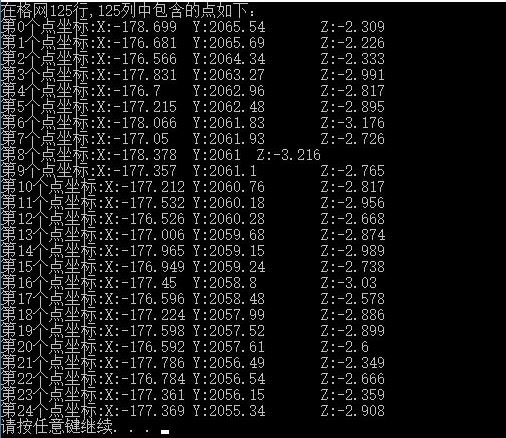版权声明:本文为博主原创文章,未经博主允许不得转载。 https://blog.csdn.net/qq_32867925/article/details/79393105
在进行机载LiDAR点云数据组织时,涉及到二维元胞数组的构建。二维元胞数组,即将点云在XOY平面上进行规则格网划分,每个格网内存储相应的点云数据,便于后续数据处理操作,如查找近邻点操作、数学形态学滤波,均涉及到点云格网化。在这里,主要介绍使用一种vector的二级指针编写数据组织函数。
整个代码如下:
整个代码如下:
#include<iostream>
#include<cmath>
#define PI 3.1415926
using namespace std;
#include<vector>
#include<fstream>
#include<sstream>
#include<cmath>
struct Point3D
{
double x;
double y;
double z;
};
double get_min_element(vector<double> a)
{
double temp;
double min = a[0];
for (int i = 0; i < a.size(); i++)
{
if (min>a[i])
{
temp = min;
min = a[i];
a[i] = temp;
}
}
return min;
}
double get_max_element(vector<double> a)
{
double temp;
double max = a[0];
for (int i = 0; i < a.size(); i++)
{
if (max < a[i])
{
temp = max;
max = a[i];
a[i] = temp;
}
}
return max;
}
//数据组织函数
void PointPutIntoGrid(char *str,vector<Point3D> **grid)//二级指针
{
ifstream infile(str, ios::in);
double x, y, z;
Point3D point;
char line[64];
vector<double> Xarray, Yarray;
vector<Point3D> PointCluster;
while (infile.getline(line,sizeof(line)))
{
stringstream word(line);
word >> x;
word >> y;
word >> z;
point.x = x;
point.y = y;
point.z = z;
PointCluster.push_back(point);
Xarray.push_back(x);
Yarray.push_back(y);
}
double Xmin = get_min_element(Xarray);
double Xmax = get_max_element(Xarray);
double Ymin = get_min_element(Yarray);
double Ymax = get_max_element(Yarray);
int rows = ceil((Ymax - Ymin) / 30);//行数
int columns = ceil((Xmax - Xmin) / 30);//列数
//****************************************************不要重复再分配内存空间
for (int i = 0; i < PointCluster.size(); i++)
{
int rowID = floor((PointCluster[i].y - Ymin) / 30);
int columnID = floor((PointCluster[i].x - Xmin) / 30);
grid[rowID][columnID].push_back(PointCluster[i]);
}
}
#define Value1 125
#define Value2 8
void main()
{
char *fileName = "XXX:\\.测试数据.xyz";
ifstream infile(fileName, ios::in);
double x, y, z;
Point3D point;
char line[64];
vector<double> Xarray, Yarray;
vector<Point3D> PointCluster;
while (infile.getline(line, sizeof(line)))
{
stringstream word(line);
word >> x;
word >> y;
word >> z;
point.x = x;
point.y = y;
point.z = z;
PointCluster.push_back(point);
Xarray.push_back(x);
Yarray.push_back(y);
}
double Xmin = get_min_element(Xarray);
double Xmax = get_max_element(Xarray);
double Ymin = get_min_element(Yarray);
double Ymax = get_max_element(Yarray);
int rows = ceil((Ymax - Ymin) / 30);//行数
int columns = ceil((Xmax - Xmin) / 30);//列数
//*************************************************在具体使用时,是要声明空间内存的*********************************
vector<Point3D>**arr = new vector<Point3D>*[rows];
for (int i = 0; i < rows; i++)
{
arr[i] = new vector<Point3D>[columns];
}
PointPutIntoGrid(fileName, arr);
cout << "在格网" << Value1 << "行" << "," << Value1 << "列中包含的点如下:" << endl;
cout << "在格网" << Value1 << "行" << "," << Value1 << "列中包含的点如下:" << endl;
for (int i = 0; i < arr[Value1][Value2].size(); i++)
{
cout << "第" << i << "个点坐标:" << "X:" << arr[Value1][Value2][i].x << "\t" <<
"Y:" << arr[Value1][Value2][i].y << "\t" << "Z:" << arr[Value1][Value2][i].z << endl;
}
system("pause");
}
最后运行效果如下所示:

特别注意:
在进行编写点云数据组织函数时,不要再次重新分配内存,否则会报错。但是在main()函数中,则是需要对函数指针进行内存分配的。
最后运行效果如下所示:

特别注意:
在进行编写点云数据组织函数时,不要再次重新分配内存,否则会报错。但是在main()函数中,则是需要对函数指针进行内存分配的。